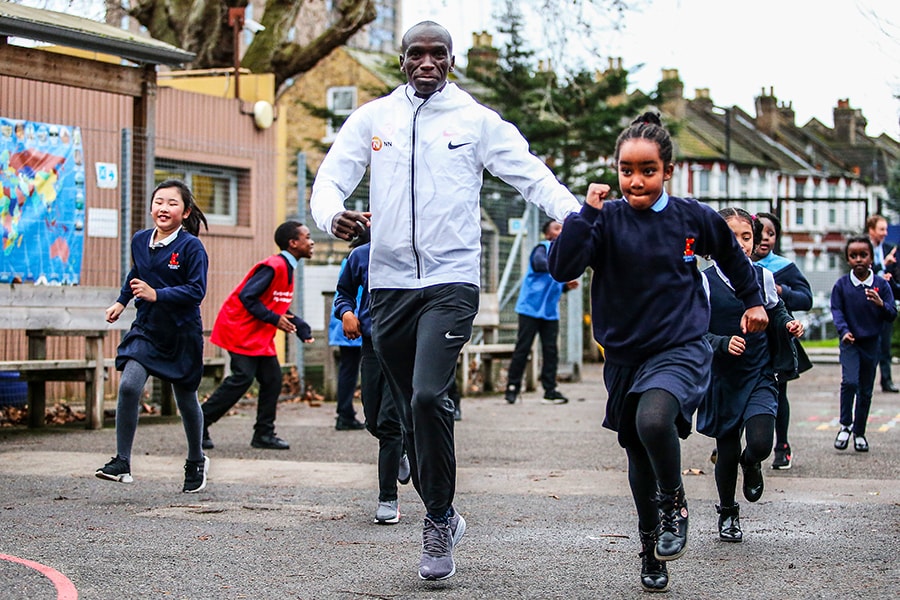
No human is limited: Eliud Kipchoge
The running legend from Kenya on why he attempted to be the first human to run a marathon under 2 hours, and how he achieved it
 Eliud Kipchoge runs alongside students at Earlsmead Primary School to show support for the London Marathon Daily Mile Initiative on December 13, 2019 in London, England. Image: Tottenham Hotspur FC/Tottenham Hotspur FC via Getty Images
Eliud Kipchoge runs alongside students at Earlsmead Primary School to show support for the London Marathon Daily Mile Initiative on December 13, 2019 in London, England. Image: Tottenham Hotspur FC/Tottenham Hotspur FC via Getty Images
On a misty morning in Vienna in October 2019, Kenyan long-distance runner Eliud Kipchoge struck down the finishing tape as well as “the last barrier of modern athletics” by running the marathon distance of 26.2 miles in under 2 hours. Kipchoge’s timing of 1:59:40 isn’t officially recognised as a world record as the conditions—a straight and even track, a battery of world-class pace-setters and special shoes, among others—were carefully chosen to propel him towards it. But it takes nothing away from a feat that transcends the realm of mere statistics and accomplishes what was once considered invincible: No athlete since Roger Bannister in 1954, a British medical student who became the first ever to run a mile in under 4 minutes, had upended notions of human endurance as Kipchoge.
The 35-year-old, a gold medallist at the 2016 Olympics, has now been roped in as the ambassador for the Sunfeast India Run As One initiative, a virtual movement that is raising funds for livelihoods affected by Covid-19. In an email interaction with Forbes India from London, where he is housed in a bio-bubble for the marathon on October 4, Kipchoge discusses his running philosophy and why the initiative is close to his heart. Edited excerpts:
Q. How did you start running? What led you to take it up professionally?
I had many inspiring athletes around me while growing up in my home country, Kenya. And my neighbour happened to be Patrick Sang, the Olympic medallist, and he took up coaching me when I was 16. Running makes me happy. It gives me focus and hope in life. Also, I am really good at it!
Q. After winning two Olympic medals in 2004 and 2008, you failed to make it to the team for the 2012 Olympics, which caused you to switch to marathon. What was going through your mind when you made the decision?
It was my time to go to marathons and I made my mind up for the distance.
Q. How do you prepare to run a marathon? What do you do to build up endurance?
Around four months before a marathon, we start with a gym programme and easy long runs to build a strong foundation. During those months, we build up kilometres to around 200-220 per week. We train twice a day, six days a week. I stay focussed on my training and that gives me the confidence to run the distance.







